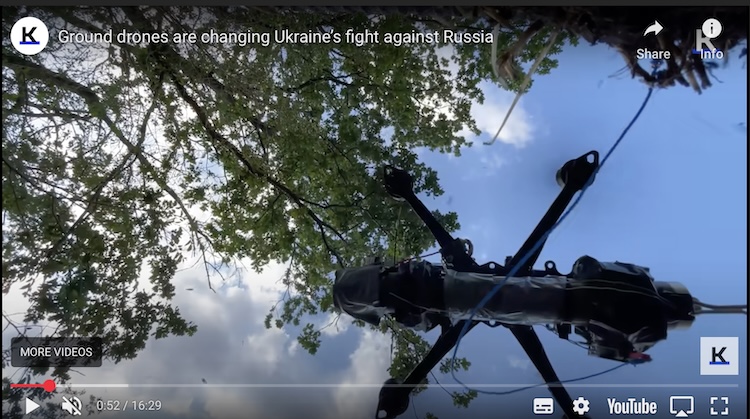Impact on the Future of Security Guarantees
By Ramesh Jaura
This article was first published on https://rjaura.substack.com/
BERLIN | 24 August 2025 (IDN) — On a grey October morning, in a nondescript office tucked behind sandbagged checkpoints, Ukrainian officers clustered around a wall of screens, recalls a colleague in Kyiv.
Drones drifted above a treeline on the Donbas steppe; commercial satellites had swept the same grid an hour earlier; thermal sensors were painting faint signatures across an artillery-churned field. Within minutes, an algorithm stitched these feeds into a single picture and proposed a short list of likely Russian firing positions. A commander clicked, a fire mission spun up, and a familiar whine—the sound of Western precision rockets—answered.
This scene, repeated countless times along Ukraine’s battered front lines, captures Kyiv’s not-so-secret advantage: software that collapses time. And behind much of that software is a Denver-based company whose name evokes Tolkien’s all-seeing stones: Palantir Technologies.
For nearly two decades, Palantir has been Silicon Valley’s most polarizing spy-tech firm, building platforms that fuse sprawling datasets for intelligence agencies, militaries, and corporations. In Ukraine, its tools have done something more urgent: fuse battlefield intelligence, accelerate targeting, document war crimes, and even help plan for postwar demining.
But Palantir’s role is not just tactical. It speaks to a larger transformation: how Western allies are learning to provide security guarantees without treaties, not through troops and tanks, but through code, contracts, and commercial ecosystems.
Compressing the Kill-Chain
Modern war is a race against entropy. The longer it takes to decide, the more a target moves, shoots, or hides. In 2022 and 2023, as Ukraine began receiving Western precision weapons—most famously HIMARS rocket systems—their success depended less on range than on the speed and quality of data feeding them, say knowledgeable sources.
Palantir’s Gotham platform became central to that process. It ingests drone video, satellite imagery, intercepted communications, even tips from civilians using Ukraine’s “E-Enemy” app and fuses them into a coherent operational picture. Its Meta Constellation tool goes further, orchestrating swarms of commercial satellites to focus on a commander’s question: “What changed along this rail line since midnight?” Its newer Artificial Intelligence Platform (AIP) layers generative-AI interfaces and policy guardrails, allowing commanders to pose natural-language queries and receive traceable, actionable options.
The result: targeting cycles measured in minutes, not days. A U.S. general noted that by September 2022, Ukraine had struck more than 400 Russian targets with HIMARS alone. Analysts credit not only the rockets’ accuracy but also software-enabled targeting pipelines that Ukraine built with partners like Palantir.
Alex Karp, Palantir’s CEO, put it bluntly: “We are responsible for most of the targeting in Ukraine.” The claim is hard to verify—Ukraine’s kill-chain is multinational and multifaceted—but independent reporting confirms Palantir’s deep integration into Ukrainian operations. In effect, Ukraine now fights at NATO speed, without being in NATO.

Building Cases, Not Just Strikes
Not all of Palantir’s work ends in explosions. In 2023, Ukraine’s Prosecutor General partnered with the company to process the deluge of digital evidence of alleged Russian war crimes. Drone footage of bombardments, timestamped Telegram posts, intercepted chatter, satellite passes—all are poured into Palantir’s systems, which help investigators correlate, tag, and structure the evidence for use in courts.
Here, the objective is not intelligence but justice. For Kyiv, building airtight war-crimes cases is as strategic as firing rockets. It strengthens Ukraine’s moral standing, rallies support in sceptical Western capitals, and lays the groundwork for eventual accountability in The Hague—seat of the International Court of Justice—or beyond. Palantir’s tools help transform raw horror into legal scaffolding for long-term security guarantees: allies can point not just to military aid, but to a shared commitment to law over aggression.
Demining as Deterrence
Ukraine today is the most heavily mined country on Earth. Vast belts of Russian-laid explosives choke farmland, forests, and villages, rendering millions of hectares unusable. Traditional clearance methods could take a century.
In 2024, Palantir struck a partnership with Ukraine’s Ministry of Economy to apply AI to demining at scale. The system prioritizes where to clear first—maximizing lives saved and hectares returned—while coordinating humanitarian teams like the HALO Trust. Drones, satellites, and ground sensors feed into Palantir’s platforms, which map contamination and assign risk scores.
This is not just postwar planning. It is security in another form: restoring Ukraine’s breadbasket, stabilizing its economy, and ensuring civilians can return safely. It also ties Ukraine’s recovery directly to Western tech ecosystems—embedding reconstruction into the same digital spine that powers its defence.
Security Guarantees in Code
Palantir’s presence in Kyiv illustrates a paradox. On one hand, it creates strategic dependence: Ukraine’s kill-chain, evidence management, and demining plans are tied to a private U.S. firm. On the other hand, that dependence functions as a de facto guarantee. By hardwiring Ukraine’s survival into Western software, Kyiv ensures that abandonment becomes politically and operationally costly for its allies.
This is the emerging face of security guarantees being discussed after the steps taken toward ending the Russo-Ukrainian War in the aftermath of the US-Russian Alaska Summit on 15 August. For decades, security guarantees meant treaties and troops: NATO’s Article 5, U.S. bases in Germany, nuclear umbrellas over Japan. Ukraine’s reality is different. NATO membership remains elusive, but Ukraine already lives under a kind of software-based guarantee: a fusion of Western arms and Western platforms that ensures it can out-think, out-target, and out-adapt Russia.
Global Echoes
Ukraine is not alone. Around the world, states are adopting software-based guarantees to offset geopolitical risks.
- Israel has layered AI-enabled targeting platforms—some reportedly developed with Palantir—onto U.S. aid, creating an enduring technological edge.
- Taiwan, excluded from NATO, relies on U.S. and allied tech partnerships: commercial satellites, cyber-defence, and experimental AI pipelines. Here, dependency is deterrence; Beijing knows Western tech would be in the fight from day one.
- Gulf states like Saudi Arabia and the UAE are embedding Palantir and other Western platforms into national infrastructure, from smart cities to health systems. For them, the presence of U.S. firms is a form of insurance against political abandonment.
- Ecuador, in 2025, deployed Palantir’s AI to modernize customs and combat narcotrafficking—a security guarantee against cartels whose reach rivals the state itself.
- African nations like Kenya and Nigeria are digitizing tax and customs systems with AI, creating proto-guarantees of stability and revenue security.
The pattern is unmistakable: treaties on paper are being supplemented—or in some cases replaced—by guarantees in code.
The Risks of Algorithmic Guarantees
This model is not without dangers. Reliance on private firms leaves states vulnerable to corporate priorities, shareholder pressure, or political disputes in Washington or Brussels. The opacity of AI decision-making raises accountability questions. And in the fog of war, accelerated kill-chains can magnify errors as well as efficiencies.
Critics warn of “digital colonialism”: states outsourcing sovereignty to Western firms. Supporters counter that in existential conflicts, survival outweighs purity—and that dependency, paradoxically, is also insurance.
The Future of Collective Security
When NATO leaders debate “security guarantees” for Ukraine, they imagine treaties, defence pacts, or new aid commitments. But on the ground, Ukraine already lives inside a guarantee of a different kind: a software-defined alliance, where Palantir and other Western platforms ensure it can think and act with allied speed.
This is deterrence by integration, and it may be the future. Israel, Taiwan, Gulf monarchies, and even Ecuador are already experimenting with it. In an era where domestic politics makes treaty ratification difficult, software guarantees provide a quietly durable alternative: politically sustainable, commercially embedded, and strategically effective.
If Ukraine prevails, it won’t be just a story of tanks and missiles. It will be the first war won, at least in part, by security guarantees written not in parchment, but in code.
Note: This analysis is based on information collected from media platforms and other Internet sources identified by ChatGPT, according to the writer’s instructions. [IDN-InDepthNews]
Image source: https://kyivindependent.com
Original link: https://rjaura.substack.com/p/software-on-the-front-line-how-palantir
Related link: https://www.world-view.net/software-on-the-front-line-how-palantir-is-aiding-ukraine-in-its-war-with-russia/


